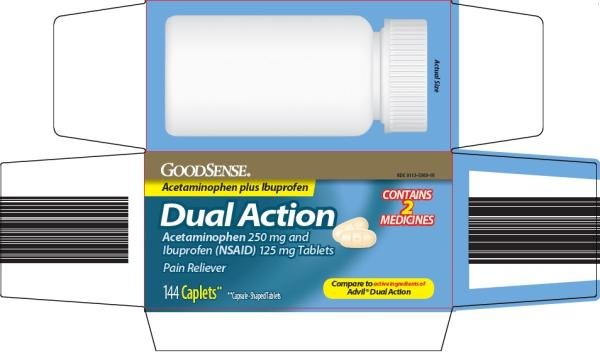Acetaminophen/ibuprofen Interactions
There are 525 drugs known to interact with acetaminophen/ibuprofen, along with 14 disease interactions, and 3 alcohol/food interactions. Of the total drug interactions, 102 are major, 382 are moderate, and 41 are minor.
- View all 525 medications that may interact with acetaminophen/ibuprofen
- View acetaminophen/ibuprofen alcohol/food interactions (3)
- View acetaminophen/ibuprofen disease interactions (14)
Most frequently checked interactions
View interaction reports for acetaminophen / ibuprofen and the medicines listed below.
- Adderall (amphetamine / dextroamphetamine)
- Adderall XR (amphetamine / dextroamphetamine)
- Alcohol (contained in alcoholic beverages) (ethanol)
- Aleve (naproxen)
- Benadryl (diphenhydramine)
- Celebrex (celecoxib)
- Cialis (tadalafil)
- Claritin (loratadine)
- Colace (docusate)
- CoQ10 (ubiquinone)
- Cymbalta (duloxetine)
- Excedrin (acetaminophen / aspirin / caffeine)
- Fish Oil (omega-3 polyunsaturated fatty acids)
- Imitrex (sumatriptan)
- Imodium (loperamide)
- Lexapro (escitalopram)
- Linzess (linaclotide)
- Metoprolol Succinate ER (metoprolol)
- Metoprolol Tartrate (metoprolol)
- MiraLAX (polyethylene glycol 3350)
- Mounjaro (tirzepatide)
- Omega-3 (omega-3 polyunsaturated fatty acids)
- Paracetamol (acetaminophen)
- Paxlovid (nirmatrelvir / ritonavir)
- Tylenol (acetaminophen)
- Vitamin B Complex 100 (multivitamin)
- Vitamin B12 (cyanocobalamin)
- Vitamin D3 (cholecalciferol)
- Vyvanse (lisdexamfetamine)
- Zyrtec (cetirizine)
Acetaminophen/ibuprofen alcohol/food interactions
There are 3 alcohol/food interactions with acetaminophen / ibuprofen.
Acetaminophen/ibuprofen disease interactions
There are 14 disease interactions with acetaminophen / ibuprofen which include:
- alcoholism
- liver disease
- asthma
- fluid retention
- GI toxicity
- rash
- renal toxicities
- thrombosis
- PKU
- PKU
- anemia
- hepatotoxicity
- hyperkalemia
- platelet aggregation inhibition
More about acetaminophen / ibuprofen
- acetaminophen/ibuprofen consumer information
- Compare alternatives
- Pricing & coupons
- Reviews (1)
- Drug images
- Side effects
- Drug class: analgesic combinations
Related treatment guides
Drug Interaction Classification
| Highly clinically significant. Avoid combinations; the risk of the interaction outweighs the benefit. | |
| Moderately clinically significant. Usually avoid combinations; use it only under special circumstances. | |
| Minimally clinically significant. Minimize risk; assess risk and consider an alternative drug, take steps to circumvent the interaction risk and/or institute a monitoring plan. | |
| No interaction information available. |
See also:
Further information
Always consult your healthcare provider to ensure the information displayed on this page applies to your personal circumstances.


